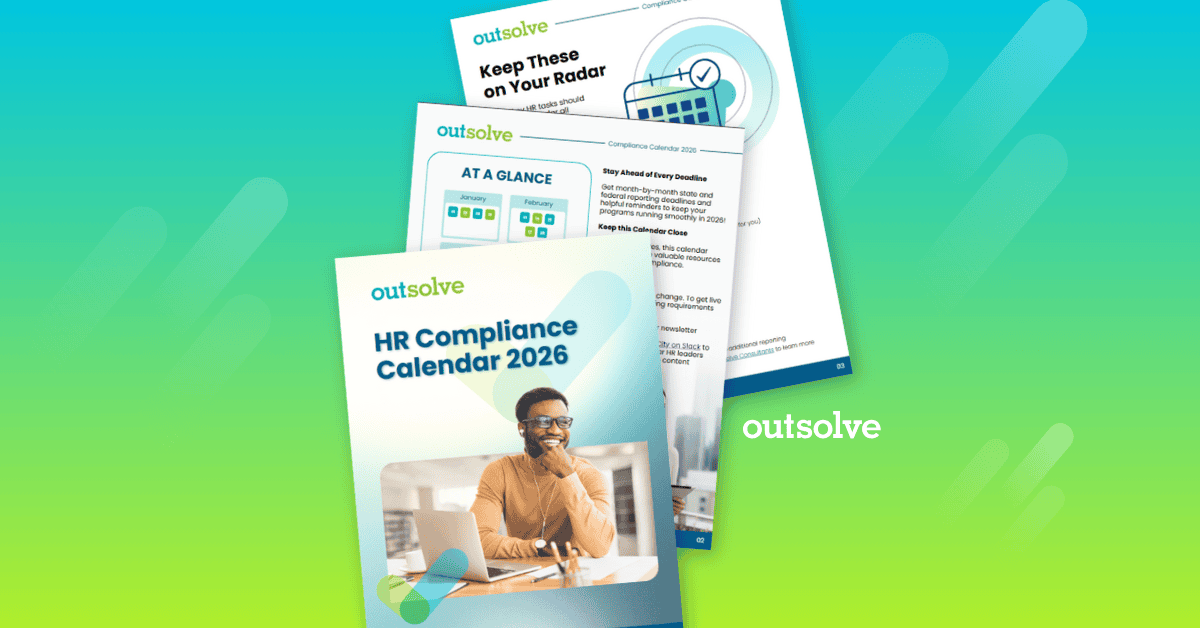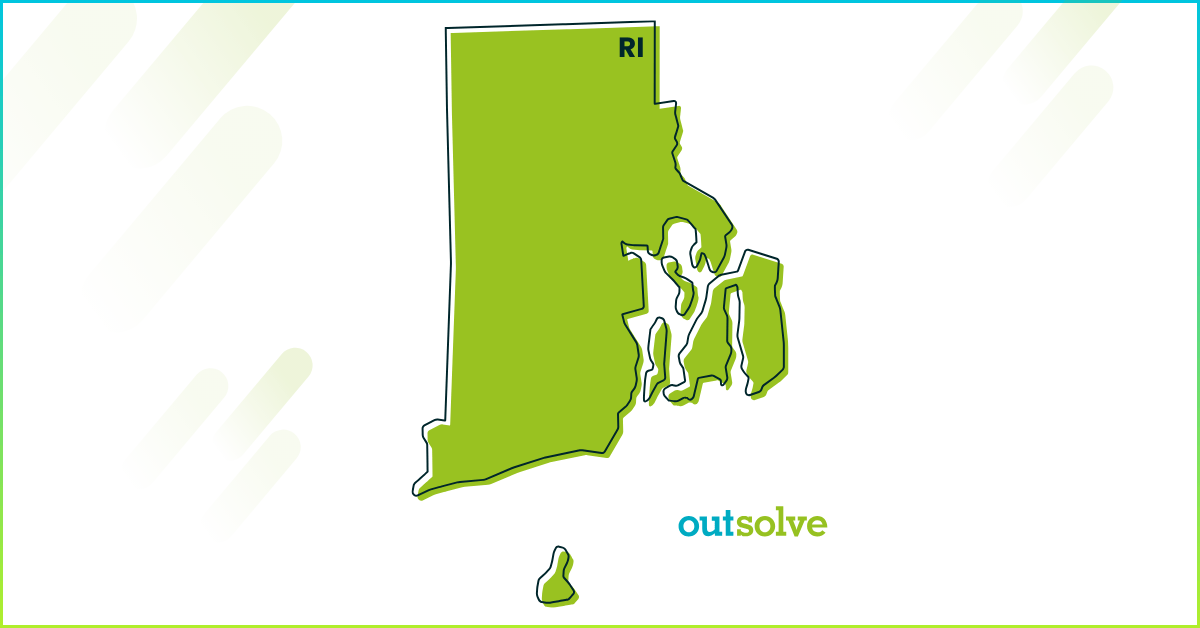4 min read
New Year, New Deadlines: 2026 HR Compliance Calendar
 Beth Montgomery
:
Nov 17, 2025 1:30:00 PM
Beth Montgomery
:
Nov 17, 2025 1:30:00 PM

Ensuring your business stays compliant with federal and state regulations is essential for all HR professionals. Missing a filing deadline or form submission can be costly both financially and reputationally to your company.
To meet this challenge, we're giving you what you need to stay compliant in 2026 and keep all your HR to-dos in one place. Resources for updates on pay transparency, Form I-9 compliance, benefits, and much more are here in one place for you.
Get started today to kick off 2026 on the right foot!
Important HR Compliance Deadlines by Month
The dates listed below are either required deadlines or OutSolve's recommendations for best practices around HR Compliance. Reviewing these deadlines and familiarizing yourself with the requirements will help you minimize your risk of non-compliance. Consult the full calendar for all deadlines and helpful links to forms and submission information. Read on for some highlights below:
January
- Place your order for the latest labor law posters to be displayed in your workplace.
- Review and finalize strategic HR goals for the year. Goals and initiatives should be measurable and relate to things that will boost employee retention and morale, improve processes, and create a positive culture.
- California: Qualifying employers must provide sexual harassment training to all employees every 2 years. The Civil Rights Department offers free training to meet this requirement.
- Beneficial Ownership Information Reports are due.
- Form 940: The Federal Unemployment Tax Act annual payment is due January 31.
- Consider conducting a compensation benchmarking review to ensure your salary decisions are based on market data.
February
- Log of Work-Related Injuries and Illnesses: Employers are required to submit once per year to OSHA. They must then post a summary detailing data from the previous year. The posting period of this summary is between February through April annually.
- Massachusetts: Qualifying employers must submit wage data reports to the state by February 1.
- Poster Update: Washington D.C.’s paid leave policy goes into effect; make sure you are displaying the correct poster.
- File IRS forms 1094-C/1095-C by February 28.
March
- Form M-1: This form is a report for Multiple Employer Welfare Arrangements (MEWAs) and Certain Entities Claiming Exception (ECEs). It must be submitted by March 1.
- OSHA Form 300: This form is due to OSHA by March 2.
- Employee Appreciation Day is March 7.
April
- Administrative Professionals Day is April 23.
May
- California: Qualifying employers must submit reports to the Civil Rights Department (CRD) by May 13, 2026.
- International HR Day is May 20.
- Mid-Year HR Compliance Check: OutSolve recommends you conduct a mid-year check to ensure you are on track with meeting all HR compliance requirements, deadlines, and self-audits.
June
- Submit RxDC reporting for 2025.
- EEO-1 Component 1 Report: Qualifying employers must report workforce demographic data including job category, sex, and race/ethnicity to the he U.S. Equal Employment Opportunity Commission. The exact deadline has not been identified as of the publication of this blog, but is expected to be in June or July 2025.
July
- Provide Summary of Material Modification (SMM) to plan participants by July 29.
- Patient-Centered Outcomes Research Trust Fund: The ACA requires issuers of specific health insurance policies to submit a form and pay a fee to PCORI by July 31.
August
- VETS-4212 Reporting Portal opens on August 1 and remains open through September 30, 2026. Employers meeting the requirements must report on their efforts to hire Veterans as part of their workforce.
- Women's Equality Day is August 28.
September
- International Pay Equity Day is September 18. This is a good day to start your pay equity audit conduct your pay equity audit for the year.
- HR Appreciation Day is September 26.
- VETS-4212 Report: The report filing deadline is September 30.
October
- Begin planning and budgeting for your HR Compliance needs for 2027.
- Qualified Small Employer Health Reimbursement Arrangement (QSEHRA): Written notice must be provided to eligible employees at least 90 days before the beginning of each plan year. If your plan year starts January 1, you should notify employees by October 1.
November
- Encourage employees to submit their Flexible Spending Account receipts before the end of the year.
- Distribute open enrollment announcements to your employees.
- Company holiday schedules should be shared by mid-November.
December
- Notify employees of any benefit or compensation changes for the next year.
- Distribute 401K, QDIA, and auto enrollment notices to participants.
- Conduct end of year compliance activities, audits, planning, and nondiscrimination testing.
Yearly HR Compliance Tasks to Keep on Your Radar
The following tasks should stay on your radar and calendar all year long. Consider prioritizing the annual tasks to a cadence that works for you, so you can spread out the self-audits during the year.
- Review and finalize HR goals
- Annual pay equity audits
- I-9 employment eligibility verification
- Determine if you need to use E-Verify
- Pull E-Verify Status Change Report every other week
- Open enrollment
- Verify minimum wage and overtime requirements
- Monitor for labor law posters updates (or sign up for service that does it for you)
- Delaware - prepare for new pay transparency laws in 2027
- Review new fair employment law protections
- Annual DEI audit
- Annual I-9 self-audit
- Prepare for EU transparency law
- Review state pay reporting
- Ensure you are meeting all state pay transparency requirements
- Illinois pay data report
- Annual non-discrimination in employment report
- Review and complete Section 503 and VEVRAA requirements
- Determine if any state EEO/AA reporting is required
- EEO-1 Component Report (deadline coming soon)
- State AAPs - check if any new state or local contracts require additional reporting
What the HR Compliance Calendar Means for Your Organization
OutSolve has created a downloadable HR Compliance calendar complete with all the above dates, reminders, and more. If you're an HR professional, you'll want this tool to ensure you have a plan in place for all compliance requirements and to avoid late fees or penalties associated with non-compliance.
Print, download, or bookmark this calendar to use as a reference throughout the year for key dates and requirements. Just imagine the peace of mind this calendar will give you in 2026.
After you've downloaded the calendar, please reach out to an OutSolve Consultant with any questions or for help navigating these requirements.
Beth has over two decades experience in HR compliance consulting and non-discrimination planning. She currently serves as Senior Director of Operations at OutSolve. Beth combines her experience as a hands-on federal contractor with her knowledge of regulatory requirements to provide support to her clients in designing and monitoring their non-discrimination programs, providing guidance on Form I-9 compliance, and conducting proactive Form I-9 audits. Beth also partners with Talent Acquisition Teams to help maximize the impact of strategic disposition reasons and advises how to monitor these results in combination with recruitment sources to get the best ROI. Prior to joining OutSolve, Beth was a Director of Affirmative Action for a Fortune 300 federal contractor where she managed a non-discrimination program for 100,000+ employees and successfully coordinated hundreds of audits. Beth is a graduate of the University of Louisville.
Weekly OutLook
Featured Posts

5 Key Compliance Items HR Can’t Afford to Ignore

HR Compliance Checklist: What Every HR Pro Needs to Know
Related Posts

What You Need to Know About the Rhode Island Pay Transparency Law
Pay transparency continues to gain traction at the state level, and Rhode Island is no exception. Let’s dive into the details of how this law works...

Legal Series: How to Balance Transparency with Confidentiality in Executive Compensation
This article is part of an ongoing legal series designed to provide insight and practical guidance on current and emerging workplace compliance...

Federal Contractor Data from 2016-2020 EEO-1 Consolidated Reports to Be Posted on OFCCP’s Website
After several years of litigation, the Office of Federal Contract Compliance Programs (OFCCP) will be posting federal contractor EEO-1 race/ethnicity...


